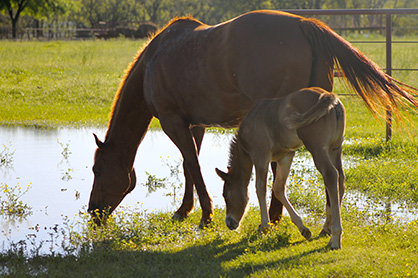The Importance of a Detox Program for the Equine Athlete

Allowing the horse to consume 1-2% of its body weight a day in forage is critically important to rebalancing a horse’s digestive system. Photo Credit: Brittany Bevis
As with human athletes, high performance equine athletes cannot be kept at peak performance year round and a rest from heavy work can actually contribute to a stronger athlete in the long run by allowing the body to heal and rejuvenate.
Competitive horses face mental and physical challenges that a less active horse does not. The intense demands during competition, stress of travel, changes to feeding routine, and the possible decrease of fiber in a horse’s diet due to lack of grazing on the road can affect health and performance. These challenges can often upset a horse’s delicate digestive system that will need to be repaired before peak performance can then again be achieved.
Poor digestion can have many negative effects on the horse. The most commonly talked about digestive disturbances in the horse industry these days are in the stomach and the hindgut, like ulcers and leaky gut. But, what about the important role that the kidney and liver play in a healthy horse?
The liver is responsible for removing toxins from the blood, and it aids in storage of trace elements and glycogen, bile production and excretion. In conjunction with the liver, the kidney is another critical filter organ and is a major regulator of fluids and electrolyte balance. In combination, these organs are responsible for vitally important functions including producing hormones that affect the absorption of nutrition in the gut, blood pressure regulation, along with Vitamin D and red cell production. All of these processes are critically important to the performance, health and well being of the horse.
Proper function of these organs is necessary for all horses. Between vaccinations, dewormers, medications, pesticides, metals in water, supplements and a heavy grain diet, the horse is subjected to many sources of active biological agents and toxins that can build up in the body. The simplest way to repair the horse’s digestive system lies in a restorative detox program.
To start a horse on a detox program, first consider the horse’s workload. The best detox program should be done during a down time or less active training schedule. With a short period of rest there is the opportunity to rebalance, refresh and restore the horse’s health through a nutrition adjustment and detox program. During this time, the horse should be allowed turnout and to participate in the types of easy activities they like best, whether it’s flatwork, trail riding or something else.
Next, adjust the diet. Forage should be front and center of the horse’s diet. Allowing the horse to consume 1-2% of its body weight a day in forage is critically important to rebalancing a horse’s digestive system. Forage consumption plays an important role in total digestive health and will contribute to alleviating potential disturbances in the stomach and hindgut.
In addition, a horse on a break doesn’t have to eat the same performance feed that it would during competition. Often horse caregivers adjust the amount (weight) of feed a horse is getting when their activity level changes, but not the type of feed. Changing to a lower energy, higher fiber feed, is important when giving the horse a break or starting a detox program. This will keep the horse’s energy low, and help restore the balance of the digestive system.
Then pick a high quality detox product to help restore liver and kidney condition. This will support the horse’s metabolism and improve the absorption of minerals and vitamins. Look for a product that has a blend of anti-oxidants, herbs and amino acid compounds. Herbs such as artichoke, milk thistle and dandelion will improve liver function and the correct blend of high quality ingredients will aid the horse with healthy weight gain, improve its overall health and performance, in addition to providing a boost to its immune system.
Administration of a short course of a reputable detox product, usually for 20-30 days, will help rebalance the horse’s digestive system and improve its ability to properly absorb the nutrition it is receiving. Ideally a detox program should be enacted twice a year, during downtime from competition. A good rule to help riders remember is to do a detox is when the horse’s hair coat changes in spring and fall.
By following these simple steps, a horse can start the road to recovery and rejuvenation that will allow it to come back into peak performance once again.
This article is brought to you courtesy of Cavalor North America, Dalton, GA – Please visit their website at http://www.cavalor.us to learn more.










